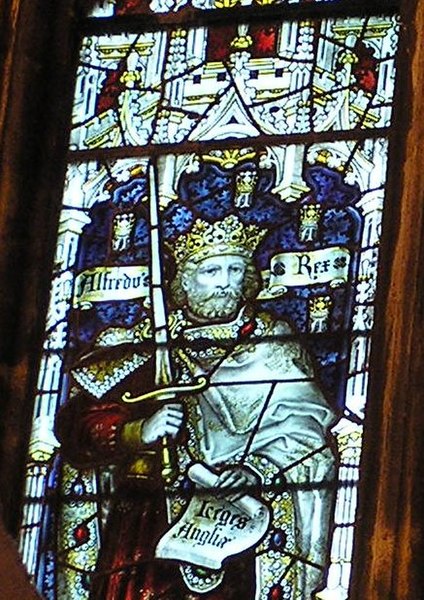Ed West‘s new book is about the only English king to be known as “the Great”:

There are no portraits of King Alfred from his time period, so representations like this 1905 stained glass window in Bristol Cathedral are all we have to visually represent him.
Photo by Charles Eamer Kempe via Wikimedia Commons.
History was once the story of heroes, and there is no greater figure in England’s history than the man who saved, and helped create, the nation itself. As I’ve written before, Alfred the Great is more than just a historical figure to me. I have an almost Victorian reverence for his memory.
Alfred is the subject of my short book Saxons versus Vikings, which was published in the US in 2017 as the first part of a young adult history of medieval England. The UK edition is published today, available on Amazon or through the publishers. (use the code SV20 on the publisher’s site, valid until 30 November, which gives 20% off). It’s very much a beginner’s introduction, aimed at conveying the message that history is just one long black comedy.
The book charts the story of Alfred and his equally impressive grandson Athelstan, who went on to unify England in 927. In the centuries that followed Athelstan may have been considered the greater king, something we can sort of guess at by the fact that Ethelred the Unready named his first son Athelstan, and only his eighth Alfred, and royal naming patterns tend to reflect the prestige of previous monarchs.
Yet while Athelstan’s star faded in the medieval period, Alfred’s rose, and so by the fifteenth century the feeble-minded Henry VI was trying to have him made a saint. This didn’t happen, but Alfred is today the only English king to be styled “the Great”, and it was a word attached to him from quite an early stage. Even in the twelfth century the gossipy chronicler Matthew Paris is using the epithet, and says it’s in common use.
However, much of what is recorded of him only became known in Tudor times, partly by accident. Henry VIII’s break from Rome was to have a huge influence on our understanding of history, chiefly because so many of England’s records were stored in monasteries.
Before the development of universities, these had been the main intellectual centres in Christendom, indeed from where universities would grow. Now, along with relics, huge amounts of them would be lost, destroyed, sold … or preserved.
It was lucky that Matthew Parker, the sixteenth-century Archbishop of Canterbury with a keen interest in history, had a particularly keen interest in Alfred. It was Parker who published Asser’s Life of Alfred in 1574, having found the manuscript after the dissolution of the monasteries, a book that found itself in the Ashburnham collection amassed by Sir Robert Cotton in the late sixteenth and early seventeenth centuries.
Sadly, the original Life was burned in a famous fire at Ashburnham House in Westminster on October 23, 1731. Boys from nearby Westminster School had gone into the blaze alongside the owner and his son to rescue manuscripts, but much was lost, among them the only surviving manuscript of the Life of Alfred, as well as that of Beowulf. In fact the majority of recorded Anglo-Saxon history had gone up in smoke in minutes.
A copy of Beowulf had also been made, although the poem only became widely known in the nineteenth century after being translated into modern English. The fire also destroyed the oldest copy of the Burghal Hidage, a unique document listing towns of Saxon England and provisions for defence made during the reign of Alfred’s son Edward the Elder. An eighth-century illuminated gospel book from Northumbria was also lost.
So it is lucky that Parker had had The Life of Alfred printed, even if he had made alterations in his copy that to historians are infuriating because they cannot be sure if they are authentic. He probably added the story about the cakes, for instance, although this had come from a different Anglo-Saxon source.
We also know that Archbishop Parker was a bit confused, or possibly just lying; he claimed Alfred had founded his old university, Oxford, which was clearly untrue, and he was probably trying to make his alma mater sound grander than Cambridge. Oxford graduates down the years have been known to do this on one or two occasions.



